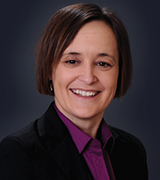About Transforming Occupational Possibilities
Scholarship within the Transforming Occupational Possibilities lab is based on the premise that occupations - a concept that refers to the range of ordinary and extraordinary forms of human doing that comprise everyday lives and societies - are central to individual and collective well-being. Differential access to occupations, such as in the realms of work, education, community life, securing essential resources, or family life, can both produce and perpetuate social and health inequities. Employing the concept of occupational possibilities, our transformative scholarship aims to enhance awareness of the detrimental individual to societal implications of occupational inequities, and generate knowledge that informs social transformations in discourses, practices, systems and policies that optimize occupational possibilities, social inclusion and well-being for equity-deserving and systemically oppressed groups.
Meet the Lead Researcher
 The Transforming Occupational Possibilities Lab is directed by Dr. Debbie Laliberte Rudman, a Distinguished University Professor in the School of Occupational Therapy and the Health and Rehabilitation Sciences Graduate Program (Occupational Science field) in the Faculty of Health Sciences at Western University. Since completion of a doctorate in Public Health Sciences at the University of Toronto in 2003, Dr. Laliberte Rudman’s program of research has focused on the socio-political and discursive shaping of inter-linked occupational, health and social inequities, with particular foci on expanding occupational possibilities for collectives negotiating precarity related to aging, work, retirement and/or unemployment. Dr. Laliberte Rudman has received national and international recognition for the methodological, theoretical, and substantive contributions of her research, particularly for the development of the concept of occupational possibilities and its application in the fields of occupational science and occupational therapy. Within the lab, working in collaboration with researchers, community organizations, graduate trainees, and groups experiencing occupational inequities, she applies critical social theory and qualitative approaches to unpack how occupational possibilities are differentially shaped in ways that deepen inequities and generate directions forward in expanding occupational possibilities. Further information regarding her work can be found at Western University (https://www.uwo.ca/fhs/ot/about/faculty/rudman_d.html) and Google Scholar (https://scholar.google.com/citations?user=6tn9MZYAAAAJ&hl=en).
The Transforming Occupational Possibilities Lab is directed by Dr. Debbie Laliberte Rudman, a Distinguished University Professor in the School of Occupational Therapy and the Health and Rehabilitation Sciences Graduate Program (Occupational Science field) in the Faculty of Health Sciences at Western University. Since completion of a doctorate in Public Health Sciences at the University of Toronto in 2003, Dr. Laliberte Rudman’s program of research has focused on the socio-political and discursive shaping of inter-linked occupational, health and social inequities, with particular foci on expanding occupational possibilities for collectives negotiating precarity related to aging, work, retirement and/or unemployment. Dr. Laliberte Rudman has received national and international recognition for the methodological, theoretical, and substantive contributions of her research, particularly for the development of the concept of occupational possibilities and its application in the fields of occupational science and occupational therapy. Within the lab, working in collaboration with researchers, community organizations, graduate trainees, and groups experiencing occupational inequities, she applies critical social theory and qualitative approaches to unpack how occupational possibilities are differentially shaped in ways that deepen inequities and generate directions forward in expanding occupational possibilities. Further information regarding her work can be found at Western University (https://www.uwo.ca/fhs/ot/about/faculty/rudman_d.html) and Google Scholar (https://scholar.google.com/citations?user=6tn9MZYAAAAJ&hl=en).

